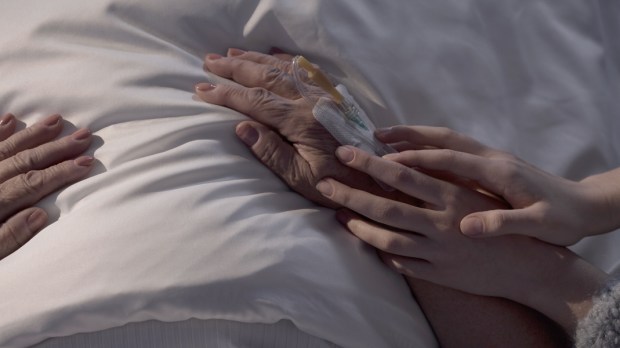A few days ago, a number of small children dressed as dragons, goblins, and witches knocked on my door demanding candy. In the process, they walked past the grinning Jack-o-lantern on the porch, which is a traditional decoration to ward off evil spirits on All Hallows Eve. The day after was All Saints Day, when we went to Mass and were encouraged by the example of all the saints who have died and are now cheering us on from above. After that was All Souls Day, when as the priest, I wore black vestments and we contemplated all those who have gone before us, and our own mortality.
All of this is to say, yeah … death is kind of on our minds right now. It’s a good month to visit the family plot at the graveyard, pull out old family photographs, or pray for family members who’ve died. It’s also a good time to think about our own impending demise.
It’s difficult to know how to handle death, which is why we’ve developed the defense mechanism of pretending it’s never going to happen to us. It seems morbid to think about ourselves in the grave, but in the right dose and in the right way it can be quite beneficial.
St. Alphonsus Ligouri is here to help with this. An 18th-century lawyer and then bishop, Ligouri wrote a number of books and one of them is called Preparation For Death. In it, he offers helpful suggestions for thinking about death in a healthy way. These suggestions will not only prepare us for the end of our earthly days, but also remind us that life is precious and to enjoy every minute.
Don’t wait until the last moment
You will die the way you lived. A lifetime of regrets cannot be settled on your deathbed and, in any case, none of us is guaranteed to even have a deathbed. For some of us, the end will come with no warning, so we don’t want to defer preparing for death until the last minute.
A somewhat harmless example from my own life is that I’ve been neglecting to plan my funeral for years now. Why? Because I think I can always do it tomorrow. My procrastination, if it continues, will eventually leave the planning burden on my family members, which is tough because they’ll already be grieving. It’s way better to prepare ahead of time — whether that means repairing a relationship, telling your family you love them, or getting your spiritual life in order.
Imagine you are a sailor, writes Ligouri, “Would it not be folly in a pilot to neglect till the time of the tempest, to provide the vessel with an anchor and a helm?” A wise sailor is prepared for the storm.
Live a good life
By this he doesn’t mean to eat, pray, and love your way around the world before you get too old. Sure, part of a good life is staying healthy, eating delicious food, and traveling. It’s also making the sacrifice to start a family, stay close to friends, and act with integrity, even when it isn’t advantageous. Ligouri thinks of it like a checkbook – you want the account to be balanced. Getting into debt not only causes heartburn, but it becomes harder and harder to pay off the longer it lingers and grows. “Settle accounts for eternity,” Ligouri says, meaning that the human soul is meant to live on beyond this life, so don’t treat it badly. It may not be the easiest path, but waiting until the very end may well make it impossible.
Live as if you’ve already died
What he means by this is to live with love. When we are “dead” to our own selfish desires, this is the path to true happiness. If we constantly feed our desires, the desire eventually becomes more important than the actual object of desire. For instance, if I want a nice house in a socially upwardly mobile neighborhood and think about it all the time, well, there’s always a nicer house. There are always wealthier, more connected neighborhoods. So I would never be satisfied even if I moved into a nicer house. I’d already be looking for the next, better house. The desire remains, but if I detach from that desire, I’m set free to be happy. Either way, we’re all going to be detached from all our desires. Ligouri recommends sooner rather than later: “Unless we do it voluntarily during life, we shall have to do it through necessity at death, but with extreme pain … ” Maintain an attitude of appreciation, free from too much desire. It will bring contentment during life and makes for a peaceful death.
Read more:
Pope Francis to Canonize Five New Saints

